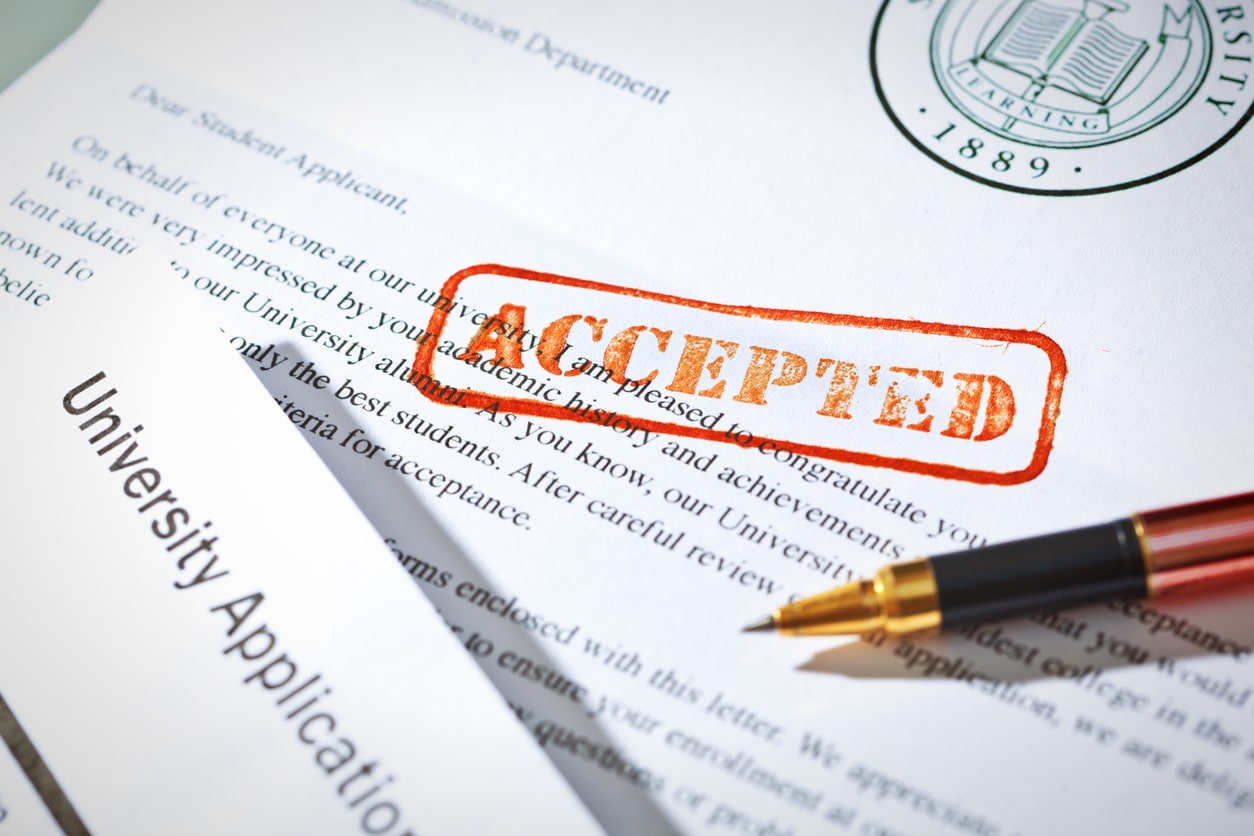Crafting an Effective Appeal Letter: A Guide for College Rejection
Written by Knovva Academy Staff

Receiving a rejection letter from a college can be disheartening for high school students who have invested time and effort into their college applications. However, all hope is not lost.
Many colleges have an appeals process in place that allows students to make a case for reconsideration. In this comprehensive guide, we’ll explore the steps and strategies for writing an effective appeal letter to colleges if you find yourself facing an initial rejection during the admissions season. However, only appeal a decision if you feel there is a legitimate reason to do so.
Can You Appeal a College Rejection?
In some cases, yes, although it depends on several factors. Some colleges may not allow for appealing nonacceptance decisions, while others do. The first step you should take after receiving a rejection letter is to reach out to the admissions office and learn about its appeals process.
Keep in mind that there are other factors to consider when appealing. Such as:
- The reason you want to appeal. Do you believe there was a mistake in the application or did your application arrive too late?
- How important is the school to you? Were you rejected by your top-choice school? If so, this is a good reason to appeal.
- Does the college offer the opportunity to appeal a decision? If it doesn’t, then you are wasting your time trying to change the decision.
- Your relationship with the admissions officers. Have you left a good impression on the admissions team?
Before starting the appeals process, ask yourself these questions. Learning the answers will help you build your appeals case.
Understanding the Appeals Process
Before diving into the specifics of writing an appeal letter, it’s essential to understand the appeals process at the college you applied to. Not all colleges offer an appeals process, and those that do may have different requirements and deadlines. Review the college’s admissions policies and guidelines for appealing a decision to ensure you follow the correct procedure.
Evaluate Your Rejection
Take time to reflect on the reasons why you were rejected by the college. Was it due to low grades, poor standardized test scores, or too few extracurricular activities? Understanding the factors that may have contributed to your rejection will help you address them effectively in your appeal letter.
In some cases, you may receive a reason for the rejection or, if you maintain a positive relationship with the admissions office, may be able to ask staff directly for feedback.
We don’t recommend calling the admissions office outright and asking for feedback unless you have an individual contact who you can reach out to.
Gather Supporting Documents
Think of your appeal as a way to advocate for yourself. You need to first understand why you’re advocating for yourself, and then get the necessary facts to support your claims. Before writing your appeal letter, gather any additional supporting documents that strengthen your case. These may include:
- updated transcripts
- letters of recommendation
- awards or achievements
- a detailed explanation of extenuating circumstances that affected your academic performance
The reason for your rejection will help you decide what to include in your appeal letter. For example, if you were rejected because of a low GPA but had an extenuating circumstance that affected your grades, get proof of that situation.
Find an Advocate
Having a teacher or mentor advocate on your behalf can make a significant difference in the appeals process. When you completed your initial college application, you most likely had to include a letter of recommendation. Now is a good time to reach out again to that teacher and ask them to write a positive letter on your behalf.
If the teacher is comfortable with it, also ask them to include their contact information so the admissions committee can reach out to them if they have further questions. Make sure to ask your teacher for permission to do this first!

Writing Your Appeal Letter
When crafting your appeal letter, keep the following tips in mind to ensure it is persuasive and compelling:
1. Get the correct contact information
Start your appeal letter by addressing it to the appropriate individual, such as the director of admissions or the admissions committee. If you don’t have the individual’s name, there are two ways to find it:
- Call the admissions office and ask who you can send the appeal to
- Search the university’s website for the director of admissions
Next, begin writing the first draft of your letter. While it can be upsetting to receive a rejection (especially if it was your preferred school), try to take the emotion out of your letter. Most importantly, use a respectful and professional tone at all times.
2. Provide a Brief Introduction
Begin your letter by briefly introducing yourself and stating the purpose of your letter — to appeal the admissions decision. While it may be tempting to talk yourself up in the introduction, remember that the admissions committee already has your application, including your college essay. They may already recognize your name and profile, so at this stage it’s important to create a concise and professional introduction. Keep it between two to three sentences, so the majority of space in your letter is dedicated to the reasons for the appeal.
3. State Your Reasons for Appeal
Clearly articulate the reasons why you believe the college should reconsider its decision. Be honest and transparent about any extenuating circumstances that may have impacted your academic performance or application.
This is where you should be clear about your personal reasons. For example, if you received a rejection because of a low GPA but had to miss classes because of an illness, you can explain your situation to the admissions team. It’s good to use plenty of details so you don’t come off as vague, but only include what you feel comfortable sharing with the admissions office.
It is important to never lie in an appeal letter. Keep in mind that an appeal should only be used in special circumstances and isn’t a solution to every rejection. Only appeal the decision if there is a genuine reason to do so.
4. Provide Evidence and Supporting Details
Back up your reasons for an appeal with concrete evidence and supporting details. Provide specific examples, achievements, and experiences that demonstrate your potential as a student and your commitment to academic success.
Using the same example from above, taking care of a health issue can get in the way of school. If being sick made you miss classes or affected your grades, you can support your appeal with a doctor’s note.
5. Express Your Continued Interest
Reiterate your genuine interest in attending the college and your commitment to contributing positively to the campus community. Highlight any specific programs, resources, or opportunities offered by the college that align with your academic and personal goals.
6. Request Reconsideration
Clearly state your request for reconsideration of the admissions decision and express your hope for a favorable outcome.
7. Close with Gratitude
End your appeal letter with a closing statement expressing gratitude for the opportunity to appeal the decision and thanking the recipient for their time and consideration.

Editing and Proofreading
Once you’ve written your appeal letter, take the time to edit and proofread it carefully. Check for spelling and grammar errors, clarity of language, and overall coherence.
Consider asking a teacher, counselor, or trusted mentor to review your letter and provide feedback before submitting it. If you have hired a college counselor, ask them to help you draft your appeal letter and review it for any mistakes or wording suggestions. There are also several different online resources you can utilize to edit your draft. Hire a professional proofreader on UpWork or Fiverr.
Submitting Your Appeal Letter
Follow the college’s instructions for submitting your appeal letter, including any specific formatting or documentation requirements. Be sure to meet the deadline for appeals and keep a record of your submission.
While writing an appeal letter increases your chances of being reconsidered, it’s essential to manage your expectations. Approximately 1 to 2% of appeal letters are accepted, and while those odds may seem stacked against you, it’s still an opportunity for one last shot.
Most students will receive a final decision three to four weeks after the admissions office receives the appeal. Regardless of the outcome, remain positive and proactive in exploring alternative options and pursuing your academic goals.
Final Thoughts
Writing an appeal letter to colleges can be a daunting task, but with careful planning, thoughtful preparation, and persuasive writing, you can increase your chances of being reconsidered for admission.
By following the steps and strategies outlined in this guide, you can craft an effective appeal letter that highlights your strengths, addresses any concerns, and demonstrates your genuine interest in attending the college. Remember to approach the process with professionalism, humility, and optimism, and be prepared to accept whatever outcome may result.